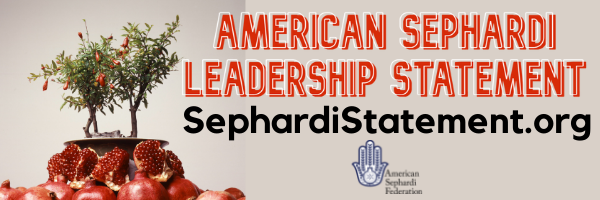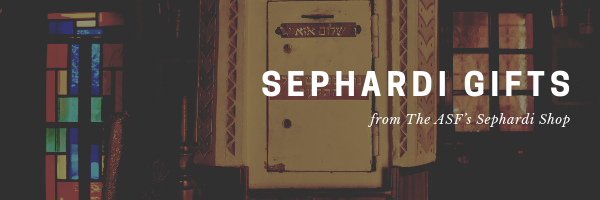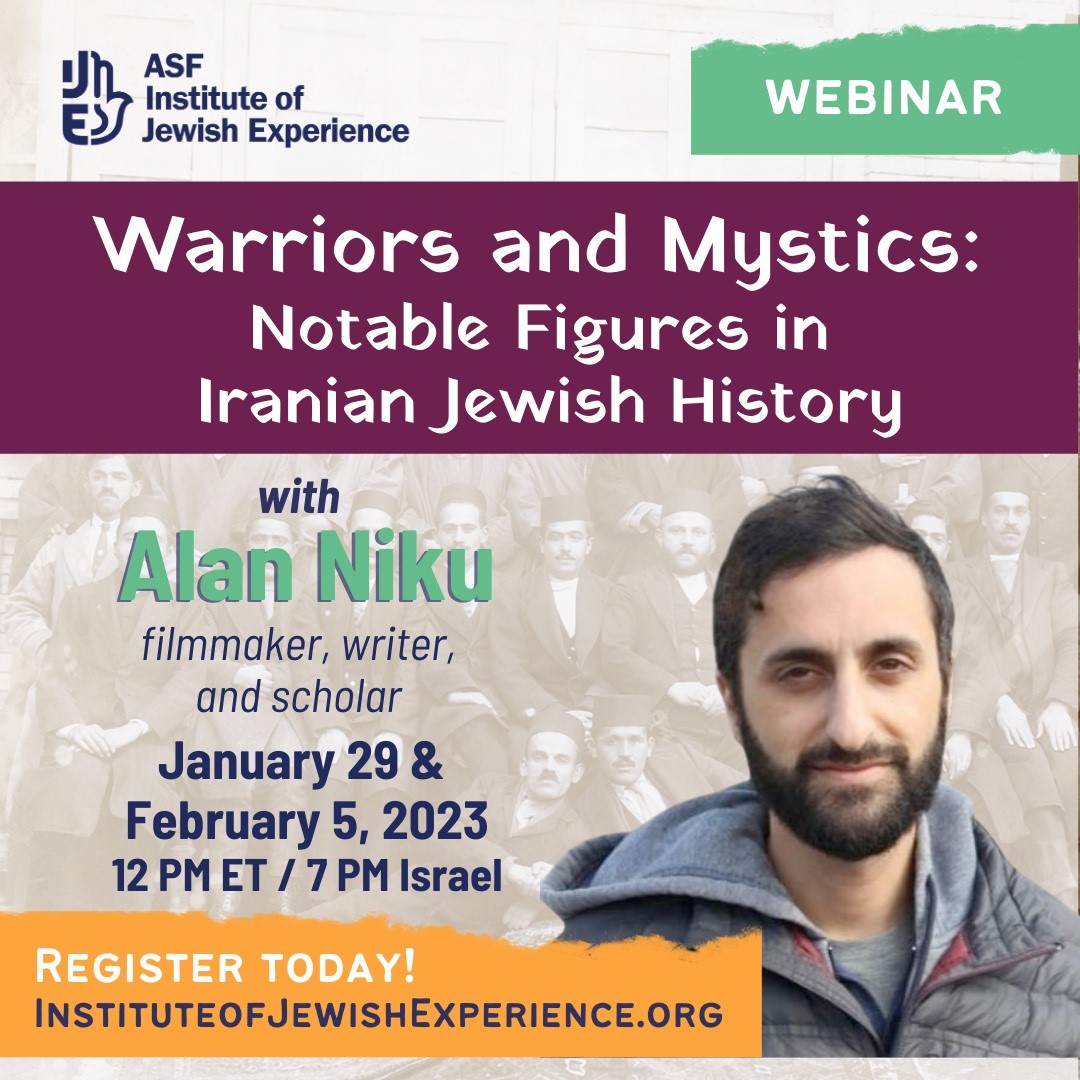In Memoriam: the Nine Iraqi Jews hanged at Baghdad on 27 January 1969: Sabah Haim Dayan, Daoud Heskel Barukh Dellal, Fouad Gabbay, Naim Khedouri Helali, Heskel Saleh Heskel, Charles Raphael Horesh, Yeheskel Gourji Namerdi, Daoud Ghali Yadgar, Ezra Naji Zilkha, as well as the two hanged at Basra: Yeheskel Eliahou Dellal and Yeheskel Raphael Yacoub, HY”D.
The Sephardi World Weekly is made possible by Professor Rifka Cook, Maria Gabriela Borrego Medina, Rachel Amar, Deborah Arellano, and Distinguished ASF Vice President Gwen Zuares!
Click here to dedicate a future issue in honor or memory of a loved one
🕍“‘Xuetas’ Return to Their Roots in Majorca”
By Ari Blaff, Tablet Magazine
Juan Caldes leads a group through Palma’s Jewish Quarter, Majorca
(Photo courtesy of Lidor Levy/Tablet Magazine)
After the Majorcan Jews were violently attacked in the 15th c., “in 1435 the entire community underwent a mass conversion.” Today the descendants of those forced converts, the Xuetas, are a distinct social group on the Spanish Mediterranean island: “If you come from Majorca and have a last name Aguiló, Bonnín, Cortès, Fortesa, Fuster, Martí, Miró (yes, like the painter), Picó, Pinya, Pomar, Segura, Tarongí, Valentí, Valleriola, or Valls you are a member of the community.” However, most Xuetas don’t want to remember the Jewish history attached to their names, “A constant throughline connecting many Xuetas are memories of discrimination. Miquel Segura, a local journalist, broke the island’s Xueta taboo in the 1990s… (He) retells an early playground experience... 'The other children… called me a Xueta, saying we had killed Jesus.’”
Feature: The Crypto-Jewish History of Majorca: “Xueta Island” ✡️🎙️
By Emily Frances, “Holy Land Uncovered,” i24News
Dani Rotstein and Emily Frances discussing Majorca’s Secret Jewish Community of over 500 years
(Photo courtesy of i24News/Youtube)
After discovering the crypto-Jewish history of Majorca—fifteen families have only married with fifteen other families for hundreds of years—New Jersey-born filmmaker and tour guide Dani Rotstein set out on a journey exploring the Xuetas, the descendants of the Mediterranean island’s pre-Inquisition Jewish population. Now he’s telling their story with a documentary, Xueta Island, shown at the 24th New York Sephardic Jewish Film Festival.
⚰️“The secret centennial of the demise of Japan’s first synagogue”
By Liane Grunberg Wakabayashi, The Jerusalem Post
The Nagasaki Jewish Cemetery
(Photo courtesy of Liane Grunberg Wakabayashi/The Jerusalem Post)
Japan reopened to the world in 1853 by designating five port cities where trade could be conducted, including Nagasaki. Today, the Nagasaki foreign cemetery includes “30 gravestones engraved with Hebrew names and burial dates ranging from 1880 to 1920.” However, it’s possible that the Jewish presence in the country dates back to two Conversos who arrived with the Portuguese in the 16th c., prior to Japan’s two hundred years of self-imposed isolation: “Mendes Pinto, a trader, arrived in 1537 and then proceeded to write a book that became a major source of knowledge in his day about Japan. Dr. Luis de Almeida, an assumed Converso, (1525-1583), was reported to have built the first European-style hospital in Japan and also to have written a memoir. Although there have been historical references to both memoirs, neither has been found. Nor have the Conversos’ graves in Japan.”
Don't miss the latest Sephardi Ideas Monthly: “Jews in Asia: From the Baghdadis to Ben Gurion & Beyond.” This month’s essay, an adaption of a chapter of Dawei Wang’s Oxford thesis, inaugurates a series.
🎥“In ‘Alegría,’ Jews, Christians and Muslims come to a boil in a Spanish melting pot”
By Rich Tenorio, The Times of Israel

Scene from the film: a Jewish bride visits a Muslim family in Morocco
(Photo courtesy of Julio Vergne/Times of Israel)
Melilla is an autonomous Spanish port city in Morocco that historically was home to Christians, Muslims, and Jews. 2022 ASF Pomegranate “Rising Star” Award Honoree, Violeta Salama, chose Melilla as the site for her celebrated film, Alegría, in which she explores the ways in which communal identities animate familial love and tension. The film’s central character, Alegría, is Jewish but “reluctant to embrace her heritage.” Salama offers that her protagonist “does not want a family, but needs it at the same time.” This contradiction, charged by questions of Jewish identity, embodies the Spanish director’s preference in creating fictional characters, “I don’t like characters that have everything understood from the beginning… People need to have contradictions.” In the present case, it also helped her craft her story, “Family always brings your contradictions out.” Alegría had its New York première at the 24th NY Sephardic Jewish Film Festival.
~~~~~~~
The American Sephardi Federation invites all individuals, communities, and organizations who share our vision & principles to join us in signing the American Sephardi Leadership Statement!
Please also support the ASF with a generous, tax-deductible contribution so we can continue to cultivate and advocate, preserve and promote, as well as educate and empower!
~~~~~~~
From Generation to Generation: a Legacy of Faith and Tolerance
By David S. Malka
From Generation to Generation: a Legacy of Faith and Tolerance is dedicated to the memory of Rabbi Shlomo Malka. It honors his memory as a Jewish scholar, a spiritual leader, and a great humanitarian.
David S. Malka is publishing this text as his personal contribution to legacy of Malka family, in the hope that this generation will re-discover their patriarch's teaching and advance his message of faith and compassion on to the next generation.
From Generation to Generation: a Legacy of Faith and Tolerance is a message of love, tolerance, and pride in one's heritage.
By Dr. Hélène Jawhara Piñer, a 2018 ASF Broome & Allen Fellow
In this extraordinary, award-winning and best-selling cookbook now in its 4th imprint, chef and scholar Hélène Jawhara-Piñer combines rich culinary history and Jewish heritage to serve up over fifty culturally significant recipes. Steeped in the history of the Sephardic Jews (Jews of Spain) and their diaspora, these recipes are expertly collected from such diverse sources as medieval cookbooks, Inquisition trials, medical treatises, poems, and literature. Original sources ranging from the thirteenth century onwards and written in Arabic, Spanish, Portuguese, Occitan, Italian, and Hebrew, are here presented in English translation, bearing witness to the culinary diversity of the Sephardim, who brought their cuisine with them and kept it alive wherever they went. Jawhara-Piñer provides enlightening commentary for each recipe, revealing underlying societal issues from anti-Semitism to social order. In addition, the author provides several of her own recipes inspired by her research and academic studies.
Each creation and bite of the dishes herein are guaranteed to transport the reader to the most deeply moving and intriguing aspects of Jewish history. Jawhara-Piñer reminds us that eating is a way to commemorate the past.
~~~~~~~
Upcoming Events or Opportunities
ASF Institute of Jewish Experience programming is asking for your input to better design our future program. This survey will not take more than 5 minutes and your input is very important.
All responses will remain confidential. In appreciation for your participation in the survey we would like to extend to you a complimentary course license ($40 value).
During 2022 we conducted over 60 programs covering different topics. Many of our programs are recorded and available on our web site at InstituteofJewishExperience.org.
Please share this survey with friends and family even if they didn’t attend our programs, their ideas are important for future programs.
We thank you for partnering with us to bring the most innovative and informative programs about our diverse Jewish nation.
~~~~~~~
The ASF Institute of Jewish Experience presents:
Warriors and Mystics
Iran’s Jewish community is one of the oldest diaspora communities in the world. But is there more to those 2700 years than Queen Esther and the Islamic Revolution? This talk examines the lesser-known parts of Iran’s Jewish History, a vast story of prophets, autonomous nations, divergent sects, epic poetry, and political intrigue.
Through the music, languages, foods, writings, traditions, and stories of two millennia, along with their ties to neighboring and faraway communities, the Jews of Iran have forged a culture at once Persian and Jewish, with traditions and aesthetics uniquely their own. In this two-part series, we will explore notable personalities in this rich history, from over 1,500 years ago and more recently.
Sunday, 5 February at 12:00PM EDT
Sign-up Now!
(Registration is required for each session; Tickets: $11)
About the speaker:
Alan Niku is a filmmaker, writer, and scholar of Mizrahi culture from San Luis Obispo, California, based in Los Angeles. A native speaker of Persian, he spends his time learning related Jewish languages, deciphering Judeo-Persian manuscripts, and interviewing community members about their stories. He is also a musician and an amateur chef, teaches history and Jewish heritage at various levels, and seeks to educate the world about the underrepresented cultures of the Middle East through his writing and films.
Sponsorship opportunities available:
~~~~~~~
The ASF Institute of Jewish Experience presents:
Exclusive Authors Series with Joseph Sassoon
Join us for a new episode of Exclusive Authors Series with Joseph Sassoon discussing his new book “The Sassoons: The Great Global Merchants and the Making of an Empire.”
Tuesday, 7 February at 12:00PM EDT
(Complimentary RSVP)
Sign-up Now!
About the book:
The influential merchants of the nineteenth and early twentieth centuries shaped the globalization of today. The Sassoons, a Baghdadi-Jewish trading family, built a global trading enterprise by taking advantage of major historical developments during the nineteenth century. Their story is not just one of an Arab Jewish family that settled in India, traded in China, and aspired to be British. It also presents an extraordinary vista into the world in which they lived and prospered economically, politically, and socially.
The Global Merchants is not only about their rise, but also about their decline: why it happened, how political and economic changes after the First World War adversely affected them, and finally, how realizing their aspirations to reach the upper echelons of British society led to their disengagement from business and prevented them from adapting to the new economic and political world order.
About the author:
Joseph Sassoon is the director of the Center for Contemporary Arab Studies and Professor of History and Political Economy at Georgetown University. He holds the al-Sabah Chair in Politics and Political Economy of the Arab World. He is also a Senior Associate Member at St Antony’s College, Oxford. In 2013, his book Saddam Hussein’s Ba‘th Party: Inside an Authoritarian Regime (Cambridge University Press, 2012) won the prestigious British-Kuwait Prize for the best book on the Middle East. Sassoon completed his Ph.D at St Antony’s College, Oxford. He has published extensively on Iraq and its economy and on the Middle East. His latest book is titled: “The Sassoons: The Great Global Merchants and the Making of an Empire” (Pantheon, 2022).
Sponsorship opportunities available:
~~~~~~~
The Belzberg Program in Israel Studies at the University of Calgary and the Schusterman Center for Israel Studies at Brandeis University. With the collaboration of the American Sefardi Federation, Centro Sefarad Israel, and the International Network for Jewish Thought present:
Sephardi Modernities Seminar Series, 2023
Join us as we explore the relationship between our narratives about the past and the future to which we aspire. The ways in which scholars approach the stories, events, characters, and historical processes of the Sephardi/Levantine past are inevitably guided by values, by their moral and political beliefs. Which elements of the past do they strive to preserve, reclaim and grant continuity? What are they trying to say about a potential future? Which stories become part of canonized history, and which ones are dismissed as mere anecdotes? Which theoretical, social, political, and cultural frameworks do they wrestle with, and which do they seek to advance?
On Zoom
(Registration is required for each session)
14 March at 12:00PM EST
Preservation of Jewish Heritage and Debating Egypt’s Past and Present
Yoram Meital, Ben-Gurion University of the Negev
Sign-up Now!
23 March at 12:00PM EDT
How Do Judeo-Spanish Proverbs and Tales Communicate with Us and How Do We Communicate With Them?
Lital Belinko-Sabah, Hebrew University of Jerusalem
Sign-up Now!
18 April at 12:00PM EST
‘Modernity’ and ‘Tradition’ on the Move: Spanish Moroccan Jews and their Diasporas
Aviad Moreno, Ben-Gurion University of the Negev, in conversation with Angy Cohen, University of Calgary
Sign-up Now!
9 May at 12:00PM EST
Sephardi Musical Modernities: Listening to the Past in the Future
Edwin Seroussi, Hebrew University of Jerusalem
Yair Dalal, Composer, violinist, oud player, singer, and teacher
Sign-up Now!
Throughout this year’s series we will discuss the future invoked by each way of looking at the past, the political agendas of historical research, and the values that unavoidably guide scholastic inquiry. Topics include the transmission of narratives among collectives and among researchers, ownership of archives, encounters with the past, the academic legitimacy of certain topics and collectives, vehicles of memory (music, oral history, proverbs, etc.) and the construction of historical narratives.
Organized by Dr. Angy Cohen, Inaugural Hy and Jenny Belzberg Postdoctoral Associate in Israel Studies, Department of Anthropology and Archaeology at the University of Calgary, and Dr. Yuval Evri, Assistant Professor of Near Eastern and Judaic Studies on the Marash and Ocuin Chair in Ottoman, Mizrahi, and Sephardic Jewish Studies, Brandeis University.
~~~~~~~
ASF Broome & Allen & ADL Collaborative for Change Fellow Isaac de Castro presents:
Entre Diasporas: Telling the Latin-American Jewish story. Contando la historia judía latinoamericana
Tell your story. Cuenta tu historia.
We’re looking for first-generation Latino Jews in the United States who immigrated because of political and social turmoil. Jews of Sephardic descent from Colombia, Cuba, and Venezuela that now reside in the Miami area will be given priority, but others are welcome to apply as well.
Fill out this form to be considered as an interviewee for this project. After you’ve submitted, we will be in touch promptly to set up a preliminary phone call.
Click here for more information.










